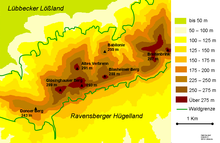|
Babilonie
The Babilonie is a hillfort of the La Tène culture at a height of 255.6 metres above sea level on the northern edge of a rounded hill in the Wiehen Hills above the Lübbecke village of Obermehnen in the district of Minden-Lübbecke in the German state of North Rhine-Westphalia. The name is derived from the Germanic baben in the lon i.e. "up in the woods".  The wedge-shaped, double-rampart system, which descends from south to north with the slope, was investigated archaeologically in the first half of the last century, especially by Friedrich Langewiesche, who assessed it as a refuge castle. Ceramic and even metalwork finds indicate that it belongs to the La Tène culture in the pre-Roman Iron Age, e vorrömische Eisenzeit, therefore probably part of an extensive trading network. The fortification has an area of over 12 hectares. The first mapping of this hilltop, which was exceptionally well-suited to the establishment of a large hillfort with its spring high up the hills, was carried out after 1880.[1] Ceramic finds from the Saxon-Frankish period have also been discovered. According to Paul Höfer there is a legend that refers to Wittekind.[2] Sources
References |
||||||||||||||||||||||||||||||||


